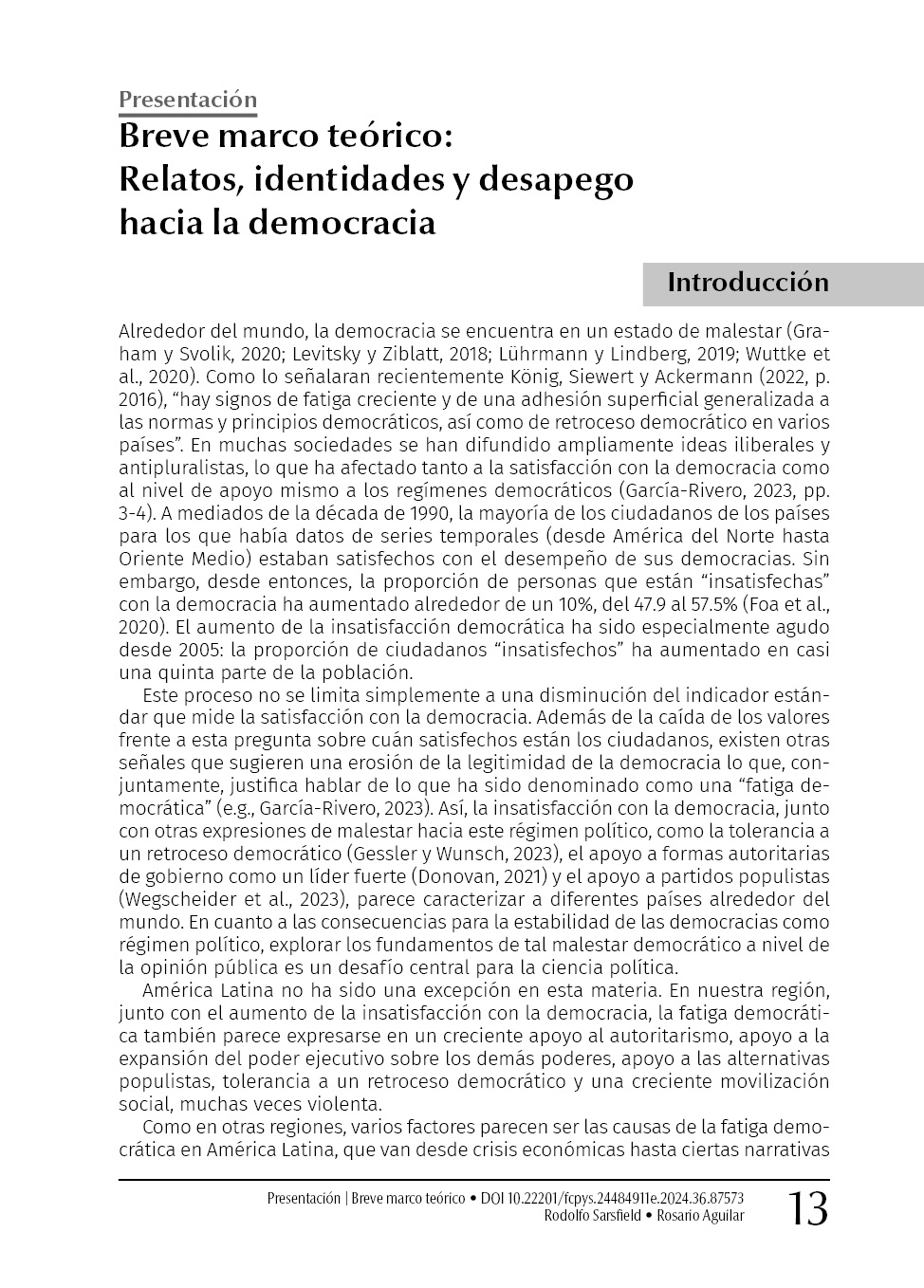Presentación | Breve marco teórico: Relatos, identidades y desapego hacia la democracia
Contenido principal del artículo
Resumen
Breve marco teórico: Relatos, identidades y desapego hacia la democracia
Detalles del artículo
Citas en Dimensions Service
Citas
Abramowitz, A.I. y Saunders, K.L. (2008). Is Polarization a Myth? The Journal of Politics, 70(2), 542–55. https://doi.org/10.1017/s0022381608080493
Alcántara, M. (17 de diciembre del 2023). Un año más de democracia fatigada. Latinoamérica 21. https://latinoamerica21.com/es/un-ano-mas-de-democracia-fatigada/
Alvesson, M. y Sköldberg, K. (2018). Reflexive methodology new vistas for Qualitative Research. SAGE.
Aslanidis, P. (2016). Populist social movements of the Great Recession. Mobilization: An International Quarterly, 21(3), 301–321. https://doi.org/10.17813/1086-671x-20-3-
Bogardus, E. S. (1947). Measurement of Personal-Group Relations. Sociometry, 10(4), 306–311. https://doi.org/10.2307/2785570.
Bronk, R. y Jacoby, W. (2020). The epistemics of populism and the politics of uncertainty. SSRN Electronic Journal. https://doi.org/10.2139/ssrn.3539587
Bruner, J. (1991). The Narrative Construction of Reality. Critical Inquiry, 18(1), 1–21. https://doi.org/10.1086/448619.
De Cleen, B. y Stavrakakis, Y. (2017). Distinctions and articulations: A discourse theoretical framework for the study of populism and Nationalism. Javnost - The Public, 24(4), 301–319. https://doi.org/10.1080/13183222.2017.1330083
Donovan, T. (2020). Right populist parties and support for strong leaders. Party Politics, 27(5), 858-869. https://doi.org/10.1177/1354068820920
Druckman, J. N. y Levendusky, M.S. (2019). What Do We Measure When We Measure Affective Polarization?. Public Opinion Quarterly, 83(1), 114–22. https://doi.org/10.1093/poq/nfz003
Enyedi, Z. (2016). Populist Polarization and Party System Institutionalization. Problems of Post-Communism, 63(4), 210–20. https://doi.org/10.1080/10758216.2015.1113883
Ewick, P. y Silbey, S. S. (1995). Subversive Stories and Hegemonic Tales: Toward a Sociology of Narrative. Law and Society Review, 29(2), 197–226. https://doi.org/10.2307/3054010
Foa, R. S., Klassen, A., Slade, M., Rand, A. y R. Williams. (2020). The Global Satisfaction with Democracy Report 2020. Centre for the Future of Democracy.
García-Rivero, C. (2023). Democracy fatigue: An East European epidemy. Central European University Press.
Gessler, T., y Wunsch, N. (2023). A New Regime Divide? Partisan Affect and Attitudes towards Democratic Backsliding. https://doi.org/10.31219/osf.io/nbwmj
Graham, M. H. y Svolik, M. W. (2020). Democracy in America? partisanship, polarization, and the robustness of support for democracy in the United States. American Political Science Review, 114(2), 392–409. https://doi.org/10.1017/s0003055420000052
Halikiopoulou, D. (2019). Introduction to the 2018 ASEN conference themed section. Nations and Nationalism, 25(2), 405–408. https://doi.org/10.1111/nana.12514
Hase, J. (2021). Repetition, Adaptation, Institutionalization. How the Narratives of Political Communities Change. Ethnicities, 21(4), 684-705. https://doi:10.1177/1468796820987311
Iyengar, S., Sood, G. y Lelkes, I. (2012). Affect, Not Ideology. Public Opinion Quarterly, 76(3), 405–31. https://doi.org/10.1093/poq/nfs038
Iyengar, S., Lelkes,Y., Levendusky, M.S., Malhotra, N. y Westwood. S.J. (2019). The Origins and Consequences of Affective Polarization in the United States. Annual Review of Political Science 22 (1), 129–46. https://doi.org/10.1146/annurev-polisci-
-073034
Koschorke, A. (2018). Fact and Fiction. De Gruyter. https://doi.org/10.1515/9783110349689
König, P. D., Siewert, M. B., y Ackermann, K. (2022). Conceptualizing and measuring citizens’ preferences for democracy: Taking stock of three decades of research in a fragmented field. Comparative Political Studies, 55(12), 2015–2049. https://doi.org/10.1177/00104140211066213
Levendusky, M. S. (2009). The Microfoundations of Mass Polarization. Political Analysis, 17(2), 162–76. https://doi.org/10.1093/pan/mpp003
Levitsky, S. y Ziblatt, D. (2018). How democracies die: What history tells us about our future. Viking.
Lührmann, A. y Lindberg, S. I. (2019). A third wave of autocratization is here: What is new about it?. Democratization, 26(7), 1095–1113. https://doi.org/10.1080/13510347.2019.1582029
McAdams, D. P. (2011). Narrative identity. En S. Schwartz, K. Luyckx, V. L. Vignoles (Eds.), Handbook of Identity Theory and Research (pp. 99–115). https://doi.org/10.1007/978-1-4419-7988-9_5
McCoy, J. y Rahman, T. (14 - 15 de marzo de 2016). Polarized Democracies in Comparative Perspective: Toward a Conceptual Framework [Conferencia]. Workshop on Polarized Polities at Georgia State University. Atlanta, EE.UU.
McCoy, J. y Somer, M. (2018). Toward a Theory of Pernicious Polarization and How It Harms Democracies: Comparative Evidence and Possible Remedies. The Annals of the American Academy of Political and Social Science, 681(1), 234–71
Moffitt, B. (2016). The global rise of populism: Performance, political style, and representation. Stanford University Press.
Monroe, K. R. (1996). The heart of altruism: Perceptions of a common humanity. Princeton University Press.
Mudde, C. (2004). Extreme right parties in Western Europe. Acta Politica, 39(3), 328–329. https://doi.org/10.1057/palgrave.ap.5500070
Nordensvard, J. y Ketola, M. (2021). Populism as an act of storytelling: Analyzing the climate change narratives of Donald Trump and Greta Thunberg as populist truth- tellers. Environmental Politics, 31(5), 861–882. https://doi.org/10.1080/09644016.2021.1996818
Polkinghorne, D. E. (1988). Narrative Knowing and the Human Sciences. Albany: State University of New York Press.
Rico, G., Guinjoan, M. y Anduiza, E. (2017). The emotional underpinnings of populism: How anger and fear affect populist attitudes. Swiss Political Science Review, 23(4), 444–461. https://doi.org/10.1111/spsr.12261
Salmela, M. y von Scheve, C. (2017). Emotional roots of right-wing political populism. Social Science Information, 56(4), 567–595. https://doi.org/10.1177/0539018417734419
Roberts, K. M. (2022). Populism and Polarization in Comparative Perspective: Constitutive, Spatial and Institutional Dimensions. Government and Opposition, 57(4), 680–702. https://doi.org/10.1017/gov.2021.14
Roberts, K. M., Sarsfield, R. y Moncagatta, P. (31 de Agosto – 4 de septiembre de 2023). The New Polarization in Latin America [Conferencia]. American Political Science Association Annual Conference, Los Angeles, EE.UU.
Sarsfield, R. y Abuchanab, Z. (2022). Populism, Storytelling, and Polarization in Mexico. APSA Preprints. https://doi.org/10.33774/apsa-2022-5cnnk
Skonieczny, A. (2018). Emotions and political narratives: Populism, Trump and trade. Politics and governance, 6(4), 62-72.
Stenmark, L. L. (2015). Why Do We Disagree on Climate Change? Storytelling and Wicked Problems: Myths of the Absolute and Climate Change. Zygon, 50(4), 922–936. https://doi.org/10.1111/zygo.12218.
Taş, H. (2020). The Chronopolitics of National Populism. Identities, 29(2), 127–145. https://doi.org/10.1080/1070289x.2020.1735160.
Wegscheider, C., Rovira Kaltwasser, C. y Van Hauwaert, S. M. (2023). How citizens’ conceptions of democracy relate to positive and negative partisanship towards populist parties. West European Politics, 46(7), 1235–1263. https://doi.org/10.1080/01402382.2023.2199376
Wuttke, A., Gavras, K., y Schoen, H. (2020). Have Europeans grown tired of democracy? New evidence from eighteen consolidated democracies, 1981–2018. British Journal of Political Science, 52(1), 416–428. https://doi.org/10.1017/s0007123420000149

Revista Mexicana de Opinión Pública por Universidad Nacional Autónoma de México se distribuye bajo una Licencia Creative Commons Atribución-NoComercial-SinDerivar 4.0 Internacional.
Basada en una obra en http://revistas.unam.mx/index.php/rmop.




